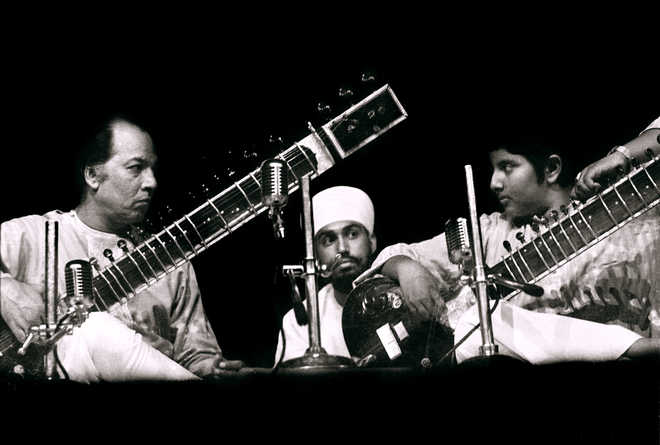Shailaja Khanna
The older generation still has memories of Ustad Vilayat Khan in Shimla — those impromptu picnics in the woods outside Mashobra, the get-togethers at Parimahal, his beautiful home on top of the hill…
Ustad Vilayat Khan’s Shimla connection started one summer when he came over for a month as the guest of Raja Padamjit Singh and stayed at a cottage in his Strawberry Hill estate. He enjoyed the ambience so much that he hired the Aira Holme Cottage for himself for the next three-four summer seasons. It is currently home to artist-historian Billy Malhans, who has fond recollections of the time.
“We would walk to the cottage sometimes to hear him play. I will always associate his landmark recording of “Night at the Taj” with his brother Ustad Imrat Khan on the surbahar with Shimla. He was always so hospitable and engaged with the locals so readily. I remember the fabulous kebabs served at his house.” Finally, the Ustad acquired Parimahal from the government on rent. He returned this prime property after he decided to relocate to Dehradun after the death of Raja Padamjit Singh.
The erstwhile royal was an erudite musicologist from the Senia beenkar tradition and, as his daughter Lalita (a musician) recalls, “Khan sahib saw in my father the father figure he had never had. I can never forget how he carried his sitar up to my father’s bedroom to play Rag Des for him after his heart attack simply because my father had remarked the night before… ‘Des sunne ki ichcha hai’.”
“We met him practically every day when he would drive from Parimahal to our home in Strawberry Hill and play poker with my father, sometimes followed by a session on his sitar or listening to music on our old ferrograph spool recorder, or just chatting about music. He was a wonderful raconteur and great company to be with.”
Shimla resident Kailash Sood, who lives in Ram Bazaar area, is one of his oldest disciples. He recalls: “I used to go to Parimahal every day to listen to him. Bhim Sen Sharma too used to be there. I would proudly do chores like procuring good vegetables and fish for him. He once came home to dine with us; I was honoured. I remember his mother so well too; she remembered so many bandishein.” Sood says Khan sahib’s grandfather, Ustad Bande Ali Khan, was the court musician in Nahan, and he had once visited there as well. “He would drive his own jeep, whose engine he had tuned so well. Later, he was given a Mercedes by the Shah of Afghanistan. Sad that the government was not able to make his dream of a music institute in Shimla come true. Khan sahib left Shimla literally overnight after staying here for around 10 years. In all these years, the HP government did not even host one public concert of his here,” he says.
Belatedly, but welcome nonetheless, the Department of Language, Art and Culture has decided to honour the memory of this iconic musician with a two-day festival. It would be held at Gaiety Theatre. The inaugural concert is by Ustad Shujaat Khan, his son, on July 5. “I have been discussing this festival with the government for some time now and am happy it has finally taken shape,” says Ustad Shujaat Khan, who has memories of the days spent here even though the family left Shimla nearly 50 years ago. Day II will see the release of a book on the musician, The 6th String of Ustad Vilayat Khan. Author Namita Devidayal says she met him only once, but retains the strong impression of “a handsome man, very drawn to children.”
The festival will end with sitar recital by Shakir Khan, grand nephew of Ustad Vilayat Khan. “His mere presence on stage was unique. He remains an inspiration for me and countless other instrumentalists. I am honoured and privileged to be representing my gharana at this festival,” says Pune-based Shakir.
Unlock Exclusive Insights with The Tribune Premium
Take your experience further with Premium access.
Thought-provoking Opinions, Expert Analysis, In-depth Insights and other Member Only Benefits
Already a Member? Sign In Now










